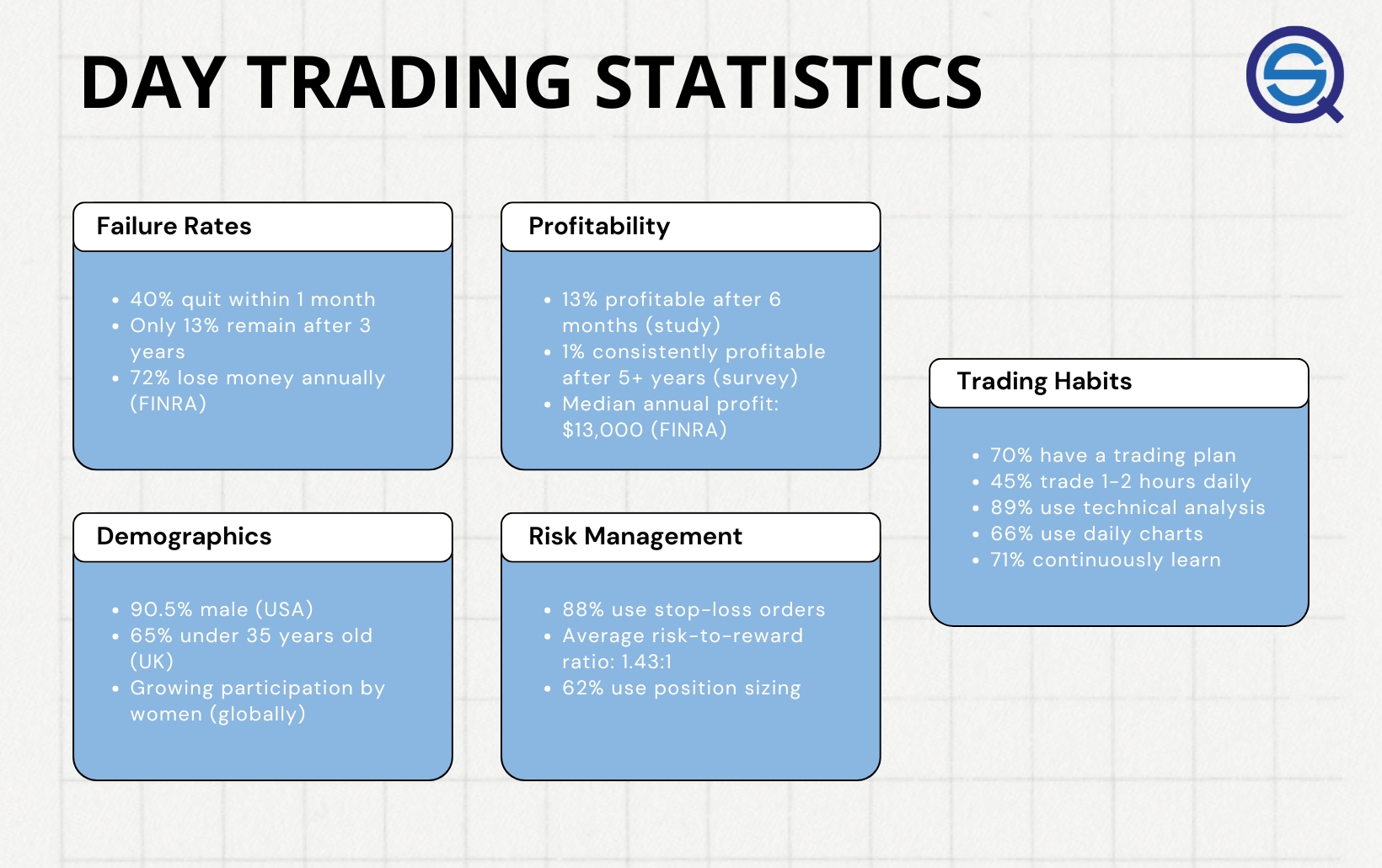Did you know that more people are likely to be bitten by a shark than to encounter a day trader in the wild? But for those who dare to navigate the fast-paced waters of day trading, understanding FINRA rules is crucial for safe and effective trading. This article dives into how FINRA regulations promote fair trading, outline specific requirements for day trading activities, and combat market manipulation. We'll cover margin requirements, protections against fraudulent brokers, reporting obligations, and oversight of trading platforms. Additionally, learn about restrictions on day trading accounts, short selling regulations, and measures to prevent excessive trading risks. Finally, we’ll explore the consequences of non-compliance and the educational resources FINRA provides, all while aligning with SEC regulations. Trust DayTradingBusiness to keep you informed and prepared in this thrilling trading landscape!
How do FINRA rules ensure fair trading for day traders?
FINRA rules protect day traders by enforcing transparency, preventing market manipulation, and ensuring fair access to trading venues. They set standards for order handling, reporting requirements, and conduct rules that deter manipulative practices like pump-and-dump schemes. FINRA’s oversight ensures that brokers execute trades honestly and fairly, reducing the risk of fraud. Additionally, their regulations promote timely disclosure of information, helping day traders make informed decisions.
What specific FINRA regulations apply to day trading activities?
FINRA rules that apply to day trading include Regulation T, which requires a 50% initial margin deposit; FINRA Rule 4210, setting margin requirements for securities; and the Pattern Day Trader rule, requiring a minimum of $25,000 in the trading account for frequent day trading. These regulations limit risk, prevent excessive leverage, and ensure traders have sufficient capital.
How does FINRA prevent market manipulation among day traders?
FINRA prevents market manipulation among day traders by enforcing rules like Regulation SHO, which limits short selling and naked shorting, and Rule 5210, which bans manipulative schemes like pump-and-dump. They monitor trading activity for suspicious patterns, such as abnormal price spikes or volume surges, and investigate potential manipulation. FINRA also requires transparent reporting and enforces penalties on traders engaging in manipulative practices, ensuring fair and orderly markets for all participants.
What are the FINRA rules on margin requirements for day traders?
FINRA requires day traders to maintain a minimum margin of $25,000 in their trading account. This applies to pattern day traders, who execute four or more day trades within five business days. If the account falls below this threshold, trading restrictions activate until the balance is restored. These rules prevent excessive leverage and protect traders from significant losses.
How does FINRA protect day traders from fraudulent brokers?
FINRA protects day traders by enforcing strict licensing and registration standards for brokers, ensuring only qualified professionals handle trades. It monitors broker activity through regular audits and surveillance to spot and stop fraudulent practices. FINRA also enforces rules against misrepresentation, churning, and unauthorized trading, holding brokers accountable. When traders suspect fraud, they can file complaints with FINRA, which investigates and disciplines violators. These measures create a safer environment, reducing the risk of scams and unfair treatment for day traders.
What reporting obligations do day traders have under FINRA rules?
Day traders must report their trading activity to FINRA, including large or suspicious transactions. They are also required to maintain accurate records of their trades and financial statements for at least three years. FINRA enforces rules that ensure transparency, prevent market manipulation, and monitor for potential violations.
How does FINRA oversee day trading platforms and brokers?

FINRA oversees day trading platforms and brokers by regulating their practices, enforcing compliance with securities laws, and monitoring trading activities for fraud and manipulation. It requires brokers to register, adhere to strict conduct standards, and maintain transparent communications with traders. FINRA conducts audits, investigates complaints, and enforces disciplinary actions against violations to ensure fair and honest trading environments for day traders.
What are the restrictions on day trading accounts according to FINRA?
FINRA restricts day trading accounts with a pattern day trader rule, requiring at least $25,000 in equity. If you fall below this, you can't make more than three day trades in five business days. Once your account drops below $25,000, you're limited to one day trade every five days until you deposit more funds. These rules aim to prevent excessive risk-taking and protect investors from significant losses.
How does FINRA regulate short selling for day traders?
FINRA regulates short selling for day traders by enforcing rules like the uptick rule, which prevents short sales except on an uptick or zero-plus tick, reducing market abuse. It requires pattern day traders to maintain a minimum account balance of $25,000 to prevent excessive risk. FINRA also monitors short sale activities for signs of manipulation and enforces reporting and compliance standards to ensure fair trading practices, protecting day traders from unfair short selling tactics.
How do FINRA rules help prevent excessive trading risks?
FINRA rules limit the amount of leverage and enforce pattern day trading minimum equity requirements, reducing excessive trading risks. They mandate minimum account balances for day traders, preventing reckless trading with borrowed money. Rules also require margin calls and impose restrictions on frequent trading to prevent overexposure. By regulating trading practices, FINRA helps protect day traders from large losses and market volatility.
What disciplinary actions can FINRA take against non-compliant day traders?

FINRA can suspend or revoke a day trader’s registration, impose fines, or bar them from the industry if they violate rules. They may also censure traders or require remedial training. These actions prevent non-compliant traders from continuing risky or fraudulent practices and protect market integrity.
How does FINRA ensure transparency in day trading transactions?
FINRA ensures transparency in day trading transactions by requiring real-time reporting of trades through the Trade Reporting and Compliance Engine (TRACE) and other platforms. Brokers must disclose trade details promptly, making transaction data accessible for regulatory review. This oversight helps detect manipulatory practices and ensures fair market practices. FINRA also enforces strict record-keeping rules, so all trades are documented and auditable, fostering trust and transparency for day traders.
Learn about SEC & FINRA Rules on Disclosure and Transparency in Day Trading
What are the consequences of violating FINRA rules for day traders?

Violating FINRA rules can lead to fines, suspension, or permanent bans from trading. It can also damage your reputation, cause legal actions, and result in the loss of trading privileges. FINRA enforcement ensures market integrity, so breaking rules risks severe penalties and financial harm for day traders.
How does FINRA support education and resources for day traders?
FINRA provides educational resources like online courses, webinars, and guides to help day traders understand market rules and best practices. It offers tools and alerts to keep traders informed about risks and regulatory updates. FINRA also enforces rules that promote transparency and fair trading, indirectly supporting traders’ understanding of their rights and obligations.
Learn about What Are Prop Firms and How Do They Support Advanced Day Traders?
How do FINRA rules align with SEC regulations for day trading?
FINRA rules set specific guidelines for day trading, including minimum account equity requirements and pattern day trader rules, which ensure traders have enough capital to handle risks. They also enforce disclosure obligations and monitor for manipulative practices, aligning with SEC regulations to prevent fraud and market abuse. Both FINRA and SEC work together to promote fair trading, with FINRA's rules acting as a safeguard to keep day traders within legal boundaries and protect them from excessive risk.
Learn about How Do SEC and FINRA Regulations Influence Day Trading Strategies?
Conclusion about How Do FINRA Rules Protect Day Traders?
In summary, FINRA plays a crucial role in safeguarding day traders by enforcing regulations that promote fair trading practices, prevent market manipulation, and protect against fraudulent brokers. The robust framework of rules regarding margin requirements, reporting obligations, and oversight of trading platforms ensures that day traders operate within a secure environment. By aligning with SEC regulations and providing educational resources, FINRA enhances transparency and fosters a responsible trading culture. For those seeking comprehensive insights into these protections, DayTradingBusiness offers valuable guidance and support in navigating the complexities of day trading.